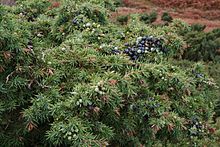Juniper Hill, Edgeworth facts for kids
| Site of Special Scientific Interest | |

Example - Juniper growing in the UK (Juniperus communis)
|
|
| Area of Search | Gloucestershire |
|---|---|
| Grid reference | and |
| Coordinates | 51°45′05″N 2°06′18″W / 51.751297°N 2.104976°W |
| Interest | Biological |
| Area | 11.25 hectare |
| Notification | 1974 |
Juniper Hill, Edgeworth is a very special natural area in Gloucestershire, England. It covers about 11.25 hectares, which is like 28 football fields! This place was officially recognized in 1974 as a Site of Special Scientific Interest (SSSI). This means it's a protected area because it has important plants, animals, or geological features.
Juniper Hill is also listed as a Key Wildlife Site (KWS) in the local plan for the Cotswold District. This shows how important it is for nature and wildlife.
Contents
Where is Juniper Hill?
This special site is located in the beautiful Cotswolds area, which is known as an Area of Outstanding Natural Beauty. This means the landscape here is so special and beautiful that it's protected.
Juniper Hill is split into two parts. It's one of only a few places that has lots of Juniper plants growing on Jurassic limestone rock. This type of rock formed millions of years ago and creates a unique home for these plants.
Plants of Juniper Hill
The Juniper plants at this site are very old, with some being over 100 years old! They have been growing here for a long time.
Northern Section Plants
The northern part of Juniper Hill has grassland that isn't grazed by animals. This means the grass grows tall and wild. You can find plants like Upright Brome and Tor-grass here. There are also pretty flowers like Common Rock Rose and climbing plants like Old Man's Beard.
Bigger trees like Oak and Ash are starting to grow back in this area. Next to this section, there's a Larch tree plantation where more Juniper plants are growing.
Southern Section Plants
The southern part of the site has grassland that is grazed by animals. This keeps the grass shorter. Here, you'll find more types of grasses called fescues and many different herbs. These plants are typical of the natural limestone grasslands found in the Cotswolds.
Protecting Juniper Hill
Sadly, many of the old Juniper plants at Juniper Hill are starting to die. Because these plants are so important and special, people are working hard to help them.
Conservation efforts are underway to try and help new Juniper plants grow. This management is important to make sure this unique habitat continues to thrive for many more years.

